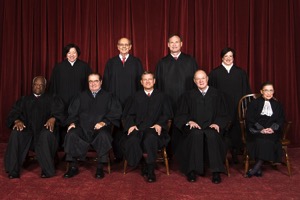
1971, the Minnesota Supreme Court upheld a lower court’s decision to deny a marriage license to a couple because they were the same sex. The couple’s appeal, known as Baker v. Nelson, was the last time the U.S. Supreme Court considered a constitutional right to same-sex marriage. To say they considered it is an overstatement, as the entire decision was one sentence: “The appeal is dismissed for want of a substantial federal question.”
For 44 years, that’s all the Supreme Court has had to say, despite other decisions in support of LGBT rights. The Prop. 8 case, Hollingsworth v. Perry, was decided on standing. Windsor v. United States forced the federal government to recognize gay marriages from states that allowed them, but didn’t directly address state bans.
On Tuesday, the silence ends when the Supreme Court hears oral arguments on the constitutionality of laws and amendments banning same-sex marriages and their recognition when crossing state lines. Most believe an opinion will come in June, and it will be longer than one sentence. To prepare for the arguments, here are some notes on the justices, starting with those least likely to support an American right to same-sex marriage.
9. Justice Clarence Thomas. Thomas dissented in the three major gay rights cases: Romer v. Evans, Lawrence v. Texas, and Windsor. He has at times gone years without asking a question at oral arguments, so Thomas saying anything is historic. Thomas saying something supportive of same-sex marriage would be epic, and possibly a sign of the apocalypse.
8. Justice Antonin Scalia. Scalia’s dissents in the three big cases have been scathing if at times amusing, e.g., Windsor was legalistic argle-bargle. Hopefully they will also prove prescient, as his Lawrence dissent argued that such reasoning would invalidate same-sex marriage bans. Many would have put Scalia as the least likely to support same-sex marriage but I have a small hope that he will bow to precedent and accept his own prediction. Or that Notorious RBG will take him to the opera and get him “not entirely sober” on one of Kennedy’s California reds before the vote.
7. Justice Samuel Alito. Alito wasn’t around for Romer or Lawrence, but he dissented in Windsor. On the upside, he joined a 7-2 decision not to put same-sex marriages on hold in Florida (Thomas and Scalia dissenting). That might mean nothing, or it might mean that Roberts can bring him along to create bigger majorities.
6. Chief Justice John Roberts. Roberts also dissented in Windsor, but he wrote Hollingsworth v. Perry, suggesting he is at least open to same-sex marriage if the law leads him there. It is also consistent with his talent for splitting the baby, as he did by his surprise decision to uphold the Affordable Care Act while striking down mandatory Medicaid expansion. Roberts also has an eye to history, dislikes 5-4 decisions, and wants the court to appear apolitical. Put it together, and one can envision Roberts joining Kennedy to avoid a 5-4 split, allowing him to write the historic opinion legalizing same-sex marriage while limiting its impact in broader questions of discrimination.
5. Justice Anthony Kennedy. Kennedy wrote all three major gay rights decisions, but Windsor was probably his favorite, allowing him to merge two of his interests: personal freedoms and state’s rights. Those priorities will be in conflict Tuesday, but Romer and Lawrence suggest that freedom can win out in Kennedy’s mind. Roberts would probably only join the decision if it is a foregone conclusion, so Kennedy’s vote is crucial, and he might tip his hand by the focus of his questions.
4. Justice Ruth Bader Ginsburg. Most Court watchers already count the next four justices, including Ginsburg, as votes to overturn the bans. Despite her progressive cult following as the “Notorious RBG”, Ginsburg gets the four spot for two reasons: she sided with Roberts to decide Hollingsworth on standing instead of getting to the merits and she has expressed concerns that the Court weighing in too early can be problematic, as with abortion laws. With a majority of states now allowing same-sex marriage, she’ll probably agree it’s time to end the “skim milk” marriages she disliked in Windsor.
3. Justice Elena Kagan. Kagan, like Ginsburg, gets a slight ding for voting with the majority in Hollingsworth, which may have prevented the Prop. 8 case from bringing marriage equality to the nation. She gets the nod over Ginsburg simply because she hasn’t said anything about acting too early.
2. Justice Stephen Breyer. Breyer has the same stances on Romer, Lawrence, Windsor, and Hollingsworth as Ginsburg, but without the voiced concerns about moving too fast. His longer track record also puts him ahead of Kagan for the No. 2 spot.
1. Justice Sonia Sotomayor. Sotomayor and Kennedy were the only Justices in the Windsor majority and the Hollingsworth minority. They may have been driven by an honest belief in the initiative process, but it makes them the only justices with a good record on LGBT rights who wanted to get to the merits of Prop. 8. If Kennedy votes to overturn the bans, history will give him the top spot, but his conservative leanings make him a riskier bet. For now, being the only reliable liberal willing to take on the issue two years ago make Sotomayor the most likely vote for marriage equality now.
My prediction: Kennedy makes it clear he is voting with the four liberal justices, so Roberts joins, and brings along a resigned Alito to buff the numbers. Roberts writes a 7-2 decision overturning the bans with some carve out for religious liberty. Agree? Disagree? Leave your rankings and predictions in the comments.











